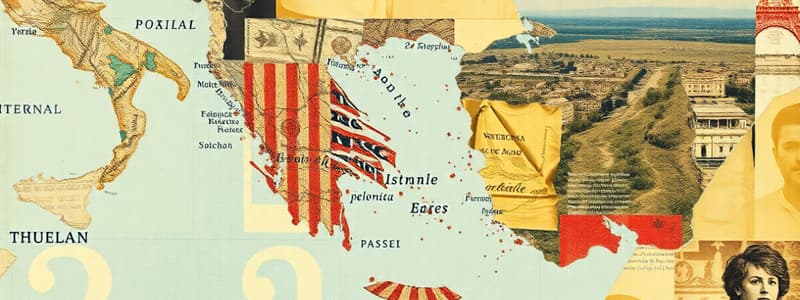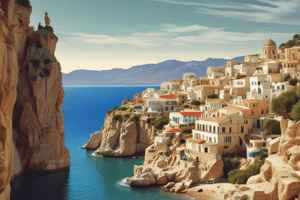Podcast
Questions and Answers
What characteristic defines the climate of Mediterranean Europe?
What characteristic defines the climate of Mediterranean Europe?
- Cold and snowy winters with wet summers
- Mild and wet winters with hot and dry summers (correct)
- Temperate with consistent rainfall throughout the year
- Hot and humid year-round
Which river is NOT part of the Mediterranean European river network mentioned?
Which river is NOT part of the Mediterranean European river network mentioned?
- Po
- Seine (correct)
- Tagus
- Ebro
What is the approximate average population density of Mediterranean Europe?
What is the approximate average population density of Mediterranean Europe?
- 100 inhabitants per square kilometer
- 150 inhabitants per square kilometer
- 117 inhabitants per square meter (correct)
- 75 inhabitants per square kilometer
Which area is likely to have the highest population density in Mediterranean Europe?
Which area is likely to have the highest population density in Mediterranean Europe?
What percentage of the population in Mediterranean Europe lives in urban areas?
What percentage of the population in Mediterranean Europe lives in urban areas?
Which of the following is NOT a significant industry in Mediterranean Europe?
Which of the following is NOT a significant industry in Mediterranean Europe?
What demographic trend is occurring in Mediterranean Europe?
What demographic trend is occurring in Mediterranean Europe?
Which of the following factors mainly contributes to the population density in Mediterranean coastal areas?
Which of the following factors mainly contributes to the population density in Mediterranean coastal areas?
Which countries are part of Mediterranean Europe?
Which countries are part of Mediterranean Europe?
What is a significant geographical feature of Mediterranean Europe?
What is a significant geographical feature of Mediterranean Europe?
What are the primary agricultural products associated with Mediterranean Europe?
What are the primary agricultural products associated with Mediterranean Europe?
Which mountain ranges are important in the topography of Mediterranean Europe?
Which mountain ranges are important in the topography of Mediterranean Europe?
How does the geographical location of Mediterranean Europe benefit its economy?
How does the geographical location of Mediterranean Europe benefit its economy?
Which of the following statements about the natural conditions of Mediterranean Europe is accurate?
Which of the following statements about the natural conditions of Mediterranean Europe is accurate?
What is the influence of Mediterranean and Atlantic air masses on the climate of the region?
What is the influence of Mediterranean and Atlantic air masses on the climate of the region?
What historical significance does Mediterranean Europe hold?
What historical significance does Mediterranean Europe hold?
Flashcards
What countries are included in Mediterranean Europe?
What countries are included in Mediterranean Europe?
The area of Europe including countries like Portugal, Spain, Italy, Greece, Malta, Andorra, San Marino, and the Vatican.
What are the key geographical features of Mediterranean Europe?
What are the key geographical features of Mediterranean Europe?
The Mediterranean Sea and the Atlantic Ocean influence the climate and provide access for trade.
What is the Strait of Gibraltar?
What is the Strait of Gibraltar?
A narrow waterway separating Africa from Europe, important for trade.
Where is Mediterranean Europe located?
Where is Mediterranean Europe located?
Signup and view all the flashcards
What kind of climate does Mediterranean Europe have?
What kind of climate does Mediterranean Europe have?
Signup and view all the flashcards
What are the key topographic features of Mediterranean Europe?
What are the key topographic features of Mediterranean Europe?
Signup and view all the flashcards
What is the historical significance of Mediterranean Europe?
What is the historical significance of Mediterranean Europe?
Signup and view all the flashcards
What are the primary agricultural products of Mediterranean Europe?
What are the primary agricultural products of Mediterranean Europe?
Signup and view all the flashcards
Mediterranean Climate
Mediterranean Climate
Signup and view all the flashcards
Rivers of Mediterranean Europe
Rivers of Mediterranean Europe
Signup and view all the flashcards
Population Distribution in Mediterranean Europe
Population Distribution in Mediterranean Europe
Signup and view all the flashcards
Economic Activities in Mediterranean Europe
Economic Activities in Mediterranean Europe
Signup and view all the flashcards
Geographic Location of Mediterranean Europe
Geographic Location of Mediterranean Europe
Signup and view all the flashcards
Population Density in Mountainous Areas
Population Density in Mountainous Areas
Signup and view all the flashcards
Aging Population in Mediterranean Europe
Aging Population in Mediterranean Europe
Signup and view all the flashcards
Immigration in Mediterranean Europe
Immigration in Mediterranean Europe
Signup and view all the flashcards
Study Notes
Mediterranean Europe: Geographical Location
- Located in the mid-latitudes of the Northern Hemisphere
- Includes Iberian Peninsula, Apennine Peninsula, and southern Balkan Peninsula
- Has access to the Atlantic Ocean and the Mediterranean Sea
- Separated from North Africa and Southwest Asia by the Strait of Gibraltar
- Strategic maritime corridor for Europe
- Facilitates optimal living conditions and various economic activities, especially tourism
- Known for Mediterranean plant cultivation (citrus fruits, olives) and wine/olive oil production
- Cradle of ancient Greek and Roman civilizations which influenced subsequent European developments
- Countries like Italy, Spain, and Portugal played a role in global cultural exchange during the Age of Exploration
Natural Conditions
- Fragmented coastline with large and smaller peninsulas, and islands
- Relief primarily mountainous, extending into the interior of peninsulas
- Coastal plains and river valleys
- Major mountain ranges including: Pyrenees, Apennines, Pindus, mountainous islands of Sicily and Sardinia and Central Meseta Plateau (Spain)
- Lower elevations found in the Po River valley and western/southwestern Iberian Peninsula
- Rocky soils in mountainous areas
Population and Economy
-
Population: Approximately 128 million with a high average density (around 117 per square kilometer)
-
High population density concentrated in coastal areas and river valleys
-
Lower density in mountainous areas
-
Urban population: 72.6%
-
Urban centers facing immigrant waves mainly from North Africa, Southwest Asia, and Eastern Europe
-
Negative natural population growth leading to an aging population
-
Economic fluctuations, stock market crises, job losses, inflation, banking system turmoil
-
Economic reforms implemented to address these issues
-
Major economic sectors:
- Light and food industry
- Car manufacturing industry
- Chemical and pharmaceutical industry
- Electronic/appliance industry
- Agriculture, animal husbandry, fishing, tourism and transport.
Studying That Suits You
Use AI to generate personalized quizzes and flashcards to suit your learning preferences.




